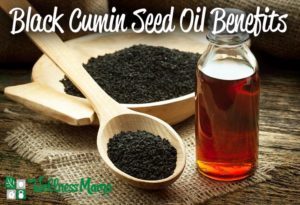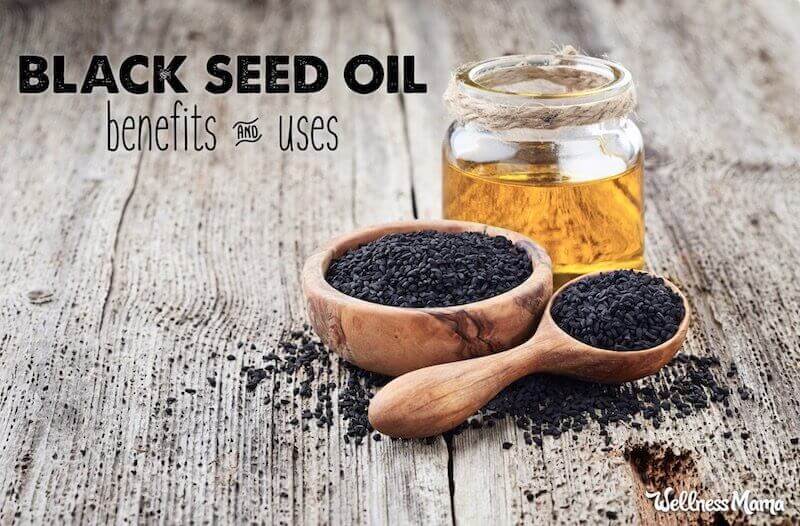There are so many simple natural remedies with a long history of use that have been largely forgotten in modern times. From the health-promoting (and hair-growing) properties of castor oil to the natural remedy uses for apple cider vinegar, remedies found in nature have an important place in maintaining health. One of those is black seed oil.
With all the wonderful advances in medicine and hygiene, a lot of these remedies have been pushed aside. Certainly, there is a time and a place for medicine, but research is now helping us understand the mechanism of these natural remedies that previous generations have depended on for so long.
Many doctors, especially functional medicine and naturopathic doctors, are finding success in combining conventional medical treatments with natural ways to support the body. One of these age-old remedies gaining popularity is black seed oil or Nigella sativa.
What Is Black Seed Oil?
Black seed oil (also often called black cumin seed oil, black coriander oil, or simply black oil) comes from the Nigella sativa plant that is native to Asia. Studies on this incredibly powerful seed oil show it may be helpful in combating superbugs like MRSA or h.pylori and even has helped some cancer patients.
The plant is technically part of the buttercup family and has small, black, crescent-shaped seeds. Historical accounts of black seed use date back as far as the times of King Tut in ancient Egypt. Cleopatra reportedly used black cumin seed oil for beautiful hair and skin, and Hippocrates was fond of using it for digestive troubles.
There are now over 600 studies showing the effects of black cumin seed oil and there is promising research on it use for dealing with autoimmune disease (which is why I’ve been experimenting with it).
Two of its active compounds, crystalline nigellone and thymoquinone, are the most studied, but it also contains myristic acid, palmitic acid, stearic acid, palmitoleic acid, oleic acid, linoleic acid, arachidonic acid, proteins, and vitamins B1, B2,B3, calcium, folate, iron, copper, zinc, and phosphorous.
Uses & Benefits of Black Seed Oil
Studies have also shown that black seed oil can be useful for:
Asthma & Allergies
Multiple studies have found that black seed oil has anti-asthmatic effects and depending on the cause of asthma, it was sometimes more effective than conventional treatment. The same properties make it beneficial for relieving allergies for many people.
Eczema and Psoriasis
Black seed oil is also used for skin problems like eczema and psoriasis. It helps soothe inflammation and improve the speed and which skin heals.
Digestion
Nigella sativa seeds are carminative, meaning they aid in digestion and may decrease gas, bloating, and stomach pain. Black seed oil is often sometimes used in remedies for intestinal parasites. In preliminary studies, it was also shown to inhibit the growth of colon cancer cells with no negative side effects.
Candida and Fungus
Black seed oil was also shown to be helpful in battling candida and fungal infections in the digestive system and on the skin.
Cancers

Other studies have shown that a compound in black seeds and oil, thymoquinone, helps induce apoptosis (cell death) in leukemia cells. Other studies have shown this same effect in breast cancer cells, brain tumor cells, pancreatic cancer, cervical cancer, and even oral cancer cells and cavity-forming bacteria. Black seed oil is also sometimes recommended as a natural protection against some of the danger from radiation and used in conjunction with conventional treatments.
Heart Health
Thymoquinone in Nigella sativa seeds has also been shown to have a protective effect on the heart, promote healthy cholesterol levels and help normalize blood pressure.
MRSA and Helicobacter pylori (H. pylori)
A 2010 study found that black seed oil was effective for patients with h.pylori infections (without ulcers). Studies have also shown that black seed oil was effective against MRSA.
Immune Health
Nigella sativa is unique in its way of supporting the immune system. It contains the antioxidants, beneficial acids, and B-vitamins you would expect in a natural remedy, but has an additional benefit. Unlike herbs like elderberry or echinacea that require caution for those with autoimmune disease, black seeds seem to balance the immune system — increasing immune function but not encouraging immune reactions against the body’s healthy tissue.
It has been used in alternative HIV protocols for years and it is often recommended on various autoimmune disease forums (with testimonials from those it has helped). I first found research on black seed oil when researching my own autoimmune thyroid disease.
Skin and Hair
It is also used topically in some cultures to naturally soften, strengthen, and firm skin and help increase hair growth. Some studies even suggest that it may be a very useful remedy against scars and to prevent scar formation on wounds.
Problems With Seed Oils
There can be problems with any vegetable or seed oil, including black cumin seed oil if it isn’t extracted, processed, or packaged correctly. It can easily go rancid if any of these factors are not correct and it is also important that the oil is stored in a dark glass bottle (preferably miron glass).
How to Find Quality Black Seed Oil
Black cumin seed oil is the most absorbable and concentrated form, and from my research, the most effective way to consume black seeds. Ultimately, it is a food product, so make sure that whatever brand you use is high quality and free from harmful additives.
When doing your research, look for brands that are preferably:
- organic
- pure-pressed without chemical extraction
- have no additives or diluting oils
- protected from rancidity by high-quality light and air-protective glass
What I Use
I buy black seed oil only from Activation Products (also on Amazon) as they meet all of my criteria above. I’ve also personally called and interviewed the founders to make sure the oils met my standards.
How I Use Black Seed Oil
Using black seed oil is pretty simple. I take a teaspoon of the oil straight a couple times a day.
Since it’s also great for skin, I also often add it to my facial oil cleansing blend. I’ve also experimented with adding it to lotions and shampoos for extra detox.
Dosage, Side Effects, & Common Sense Warnings
Black cumin seed oil is an amazing food that has been used for thousands of years for its ability to support health naturally. That being said, it isn’t a panacea or a miracle drug, just a potent natural oil. It is considered safe for culinary use (or in similar amounts… I take no more than a few teaspoons a day).
As always, use common sense. Black seed oil is a food, but a nutritionally potent one. You wouldn’t drink a gallon of coconut oil or eat five pounds of liver in one sitting (I hope), so consume black seed oil as you would any food — in moderate and healthy amounts.
As always, please check with a doctor before taking this or any substance, especially if you have a medical condition or are pregnant/nursing.
This article was medically reviewed by Dr. Scott Soerries, MD, Family Physician and Medical Director of SteadyMD. As always, this is not personal medical advice and we recommend that you talk with your doctor.
Ever heard of or used black seed oil? How do you like it? Share below!




Leave a Reply